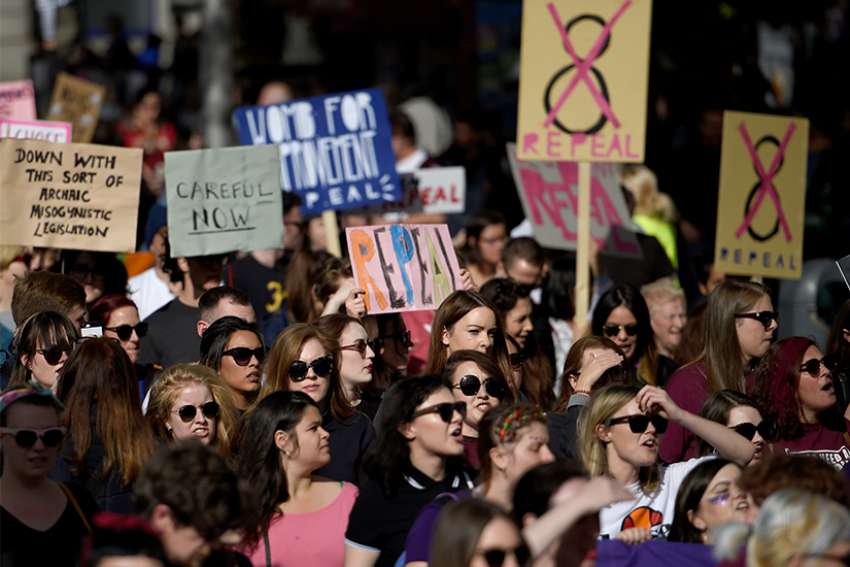It’s difficult to draw any other conclusion given the dominant response to the recent Irish referendum on the medical elimination of unborn children from their mothers’ wombs. As my fellow Catholic Register columnist Fr. Raymond de Souza noted perspicaciously on Convivium.ca, among the many arresting reactions was the jubilation sparked by the majority vote to sweep away Ireland’s existing legal controls on abortion.
Not so long ago, de Souza wrote, even the fervidly pro-choice Clintons, Bill and Hillary, spoke of the need for the invasive surgery to be “safe, legal and rare.” The Irish vote affirmed it as a universal necessity and essential condition of a civilized society.
The most frequently expressed understanding of the referendum’s outcome, after all, was that it represented a historic victory for women. Canada’s prime minister hailed it as such, as did our environment minister. Forgotten, it seems, is that this purported great leap forward for all women will be over the aborted bodies of many little Irish girls.
The once common understanding of humanity would have found this horrific enough on its own. It becomes even more disturbing in the particular context of Irish history, both distant and within the past century of life on that glorious and deeply troubled island.
During that century, the Irish fought like tigers to recover their freedom to simply live as Irish people, unfettered by the thirst of an alien government to define, as much as to control, them. All the traumas of Ireland’s 20th century — themselves the products of 19th-century British political lies, repression, manufactured impoverishment, forced emigration and hunger even unto starvation — could not staunch that insatiable desire for the liberty to live an authentically Irish future drawn from a genuinely Irish past. Such desire must be imagined as the ancestral bridge to tomorrow’s children.
Not for nothing did the rebels who led the 1916 Easter Rising, in what they acknowledged would be a “blood sacrifice” for future generations, open their proclamation of the ill-fated Irish Republic: “Irishmen and Irishwomen: In the name of God and of the dead generations from whom she receives her old tradition of nationhood, Ireland, through us, summons her children to her flag and strikes for her freedom.”
The proclamation’s words have to be understood as clear intention, not just hyperbolic oratory. The word “children” is a chosen signifier of who was intended to flourish from throwing off British rule.
Why would children not be paramount when only 75 years earlier, Ireland’s population dropped by 1.5 million (20 per cent) because of engineered famine and forced emigration?
As they grasped the repulsive immorality of such conditions, their unwavering guide was the Church herself. Historian T. Ryle Dwyer, in his biography of Eamon de Valera, illustrates the inseparability of Catholic faith and the Irish struggle for freedom with the words of Sinn Fein firebrand Mary MacSwiney as tensions mounted over the 1921 Peace Treaty finagled by the British: “We do not stand for men but for principles, and we could no more accept your treaty than we could turn our backs on the Catholic faith.”
A handful of generations later, lured by slavish secularism, Irish backs turned on the faith and on the foundations of the country it helped to forge anew in freedom. The “blood sacrifices” that such as Padraig Pearse, Thomas Clarke, James Connolly, Sean Mac Diarmada and the sainted Michael Collins made so future Irish children could be Irish children have been turned to so much dried ink in overlooked history books. Replacing them as cause for jubilation? The bloodied bodies of aborted babies, tossed aside like so many popped champagne corks.
Referendum vote or not, that’s hardly Chesterton’s democracy of the dead. No. It’s a tyranny of the living over what was and what might have been.
(Stockland is publisher of Convivium.ca and senior fellow with Cardus.)


